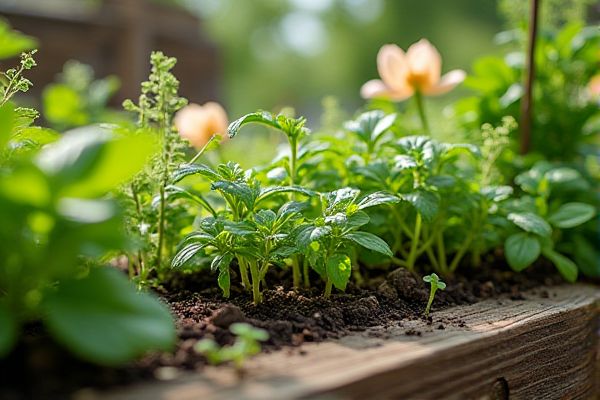
Herb garden kits focus on growing edible plants like basil, thyme, and mint, offering fresh ingredients for your cooking, while flower garden kits are designed to cultivate decorative blooms that enhance the beauty of your outdoor or indoor space. Discover which garden kit suits your lifestyle and preferences by reading the rest of the article.
Table of Comparison
| Feature | Herb Garden Kit | Flower Garden Kit |
|---|---|---|
| Purpose | Grow edible herbs for cooking and health | Grow ornamental flowers for decoration and aesthetics |
| Plant Types | Basil, Mint, Parsley, Thyme | Marigolds, Petunias, Pansies, Zinnias |
| Growth Time | 2-4 weeks to harvest | 4-8 weeks to bloom |
| Maintenance | Regular watering, sunlight, occasional trimming | Regular watering, sunlight, deadheading flowers |
| Benefits | Fresh herbs for cooking, natural remedies | Enhances garden beauty, attracts pollinators |
| Ideal For | Kitchen windowsills, small spaces | Garden beds, balconies, outdoor spaces |
| Setup Includes | Seeds, soil pods, pots, instructions | Seeds, soil pods, pots, instructions |
Introduction to Herb Garden Kits vs Flower Garden Kits
Herb garden kits provide a practical way to grow culinary and medicinal plants such as basil, thyme, and mint, offering fresh flavors and health benefits right at home. Flower garden kits emphasize vibrant blooms like marigolds, petunias, and zinnias, enhancing outdoor aesthetics and supporting pollinators such as bees and butterflies. Both kits include seeds, soil, and containers, but herb kits focus on edible plant varieties while flower kits prioritize ornamental plants for visual appeal.
Key Components of Herb Garden Kits
Herb garden kits typically include essential components such as organic soil, biodegradable seed pellets, markers for plant identification, and specialized containers designed for optimal growth of culinary herbs like basil, thyme, and parsley. These kits often feature nutrient-rich soil blends tailored to the needs of herb plants, ensuring faster germination and robust growth compared to flower garden kits. Unlike flower garden kits, which focus on a variety of ornamental blooms, herb garden kits prioritize edible plant varieties with components that support regular harvesting and ongoing care.
Essential Features of Flower Garden Kits
Flower garden kits include essential features such as a variety of colorful seeds, nutrient-rich soil or growing medium, and biodegradable pots or seed trays suited for delicate blooms. These kits often come with plant markers, instructions tailored for different flower species, and sometimes fertilizers or growth enhancers to ensure vibrant blossoms. Your choice of a flower garden kit can significantly impact the ease of growing and the success of your floral display.
Purpose and Benefits of Herb Garden Kits
Herb garden kits are designed to cultivate culinary, medicinal, and aromatic plants, providing fresh ingredients that enhance cooking and promote health. These kits offer benefits such as easy indoor growing, year-round access to herbs, and a sustainable approach to sourcing natural remedies. Compared to flower garden kits, herb garden kits prioritize utility and practicality, appealing to individuals seeking functional plants rather than ornamental blooms.
Aesthetic and Functional Value of Flower Garden Kits
Flower garden kits enhance outdoor spaces with vibrant blooms, offering substantial aesthetic value through diverse colors and textures that attract pollinators and support local ecosystems. Their functional benefits include improving air quality and providing natural habitats for beneficial insects, making them an eco-friendly option for gardeners. Compared to herb garden kits, flower garden kits often deliver greater visual appeal and ecological contributions while requiring similar levels of maintenance.
Ease of Use and Maintenance: Herb vs Flower Kits
Herb garden kits are generally easier to use and maintain due to their faster growth rates and lower water requirements compared to flower garden kits. Herbs like basil, mint, and parsley thrive in small containers and need minimal pruning, making them ideal for beginners seeking quick results. Your daily care routine will be simpler with an herb kit, as flowers often demand more attention to watering schedules, soil conditions, and pest management.
Suitable Environments for Herb and Flower Garden Kits
Herb garden kits thrive in sunny kitchens, balconies, and well-lit indoor spaces, benefiting from moderate temperatures and consistent watering to promote fragrant leaves and culinary growth. Flower garden kits require environments with ample sunlight, well-drained soil, and sufficient outdoor space for blooming, with some varieties suitable for indoor pots under grow lights. Both kits demand careful attention to light exposure and watering schedules, but herbs prefer controlled indoor conditions while flowers often flourish in open, airy outdoor gardens.
Cost Comparison: Herb Garden Kits vs Flower Garden Kits
Herb garden kits typically cost less than flower garden kits due to smaller seed packets and simpler soil requirements. Flower garden kits often include a wider variety of seeds and specialized soil mixes, increasing overall expenses. Choosing an herb garden kit can be a budget-friendly option for your gardening needs while still providing fresh, usable plants.
Sustainability and Eco-Friendliness
Herb garden kits typically promote sustainability by encouraging the growth of edible plants that reduce reliance on store-bought herbs, lowering your carbon footprint with fresh, homegrown ingredients. Flower garden kits contribute to eco-friendliness by supporting local pollinators like bees and butterflies, which are crucial for biodiversity and healthy ecosystems. Choosing between the two depends on whether your priority is enhancing food sustainability or fostering natural habitats.
Which Garden Kit is Right for You?
Choosing between a herb garden kit and a flower garden kit depends on your gardening goals and space availability. Herb garden kits offer practical benefits with fresh culinary ingredients like basil, thyme, and mint, ideal for kitchen use and small indoor spaces. Flower garden kits provide vibrant ornamental blooms such as marigolds and petunias, enhancing aesthetic appeal and attracting pollinators in outdoor gardens.
 homyna.com
homyna.com